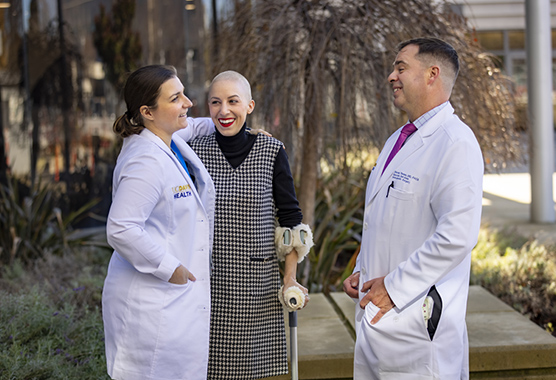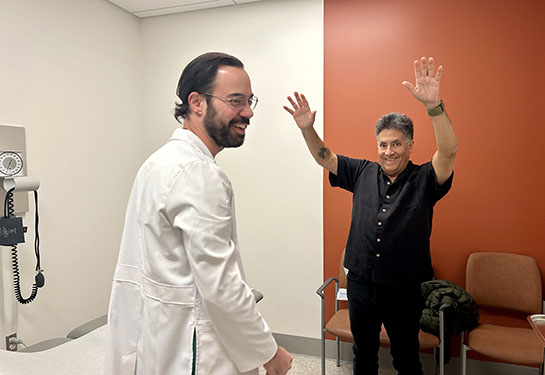Bone Conditions and Disorders
Our orthopaedics program is ranked among the top programs in the nation by U.S. News and World Report. We provide the highest level of compassionate care for all types of bone conditions.
Medically reviewed on March 26, 2024.

Specialists to Care for Your Bone Conditions
The orthopaedic specialists at UC Davis Health know that bone health can impact all parts of your life. We use the latest research to give you leading-edge treatment options for all types of bone conditions.
Types of Bone Conditions and Disorders
Bone conditions and disorders can affect your whole body or only certain areas. They can include:
- Bone cancers and tumors, such as cancers like Ewing sarcoma that begin in your bones. Cancer from other areas can also spread to your bones.
- Fibrous dysplasia, a condition where bone tissue becomes fibrous, making bones weaker
- Osteogenesis imperfecta, a genetic problem that is sometimes called “brittle bone disease”
- Osteoporosis and osteopenia, conditions where your bone mass decreases, and your bones become weaker and more prone to fractures
- Osteomyelitis, inflammation or infection in your bones
- Paget’s disease, a chronic condition that causes problems with bone formation
- Rickets, a condition that mostly occurs in children and causes bone malformations in the legs
Symptoms of Bone Conditions
Symptoms of bone conditions depend on the type of condition and how severe it is. Some conditions have no symptoms.
Common Symptoms
Possible symptoms include:
- Bone malformations
- Brittle bones or teeth
- Fractures
- Pain in your bones
Causes of Bone Conditions and Disorders
Different bone conditions have different causes. Sometimes the cause is not known.
Genetics
Changes (mutations) in certain genes can cause some bone conditions. Examples include fibrous dysplasia and osteogenesis imperfecta.
Infections
Bacterial, fungal or viral infections can lead to osteomyelitis.
Medications
Certain medications can affect your bones. For example, corticosteroids can cause bone loss.
Nutrient Deficiencies
Poor nutrition or vitamin deficiencies can affect bone development and strength. Vitamin D deficiency may cause rickets.
Other Health Conditions
Certain conditions can lead to weaker bones. Examples include autoimmune disease, celiac disease, hyperthyroid disease and type 1 diabetes.
Bone Condition Risk Factors
There are some factors that can increase your risk for bone conditions, including:
Age
Your risk of osteoporosis increases as you get older.
Biological Sex
Women are more likely than men to develop osteoporosis.
Body Size
People with small frames and thin bones have a higher risk of osteoporosis.
Diagnosing Bone Conditions
We use the most advanced equipment and methods to diagnose bone conditions. Tests we use to diagnose these conditions may include:
- Blood tests, a sample of your blood can be used to look for signs of inflammation or infection
- Bone density test, also called a DEXA scan, that checks for osteoporosis and other bone problems
- CT scan, an imaging test that can reveal problems with your bones and other tissues
- MRI, a scan that shows detailed pictures of your bones
- Ultrasound, a test that uses sound waves to create images of your bones
- X-ray, an imaging test that uses electromagnetic waves to show the shape and alignment of your bones
Treatments for Bone Conditions at UC Davis Health
Specialists at UC Davis Health Department of Orthopaedics work with researchers to stay current with the latest treatments. We use the most advanced procedures and therapies to treat all types of bone conditions.
Your treatment depends on the type of bone condition you have, what area of your body it affects and how severe it is. You may need more than one type of treatment.
Medications
If you have an infection, you may need antibiotic, antifungal or antiviral drugs. You may also need medications for pain.
Physical Therapy
Exercises can improve your strength and posture. If you have surgery, physical therapy may be part of your recovery.
Supportive Devices and Equipment
Devices such as braces, canes, orthotics and other equipment can provide support or protection and help relieve pain.
Surgery
Some bone conditions require surgery to remove damaged bone tissue, repair bones or correct malformations. Our orthopaedic surgeons use the latest treatments and most advanced procedures to treat all types of bone conditions. This includes minimally invasive surgeries.
Vitamins
If you have a bone condition caused by a nutrient deficiency, you may need to take supplements, such as calcium or vitamin D.
Preventing Bone Conditions
Many bone conditions aren’t possible to prevent. Getting enough vitamins and minerals can help prevent rickets and osteoporosis. There are also medications that can help keep osteopenia from developing into osteoporosis.
How many women get osteoporosis?
19%Of women over 50 in the U.S.
Source: Centers for Disease Control and Prevention (CDC): Osteoporosis FastStats
Request an Appointment
Our cancer specialists provide thorough evaluations and personalized treatment plans. Learn more about how to make an appointment at UC Davis Comprehensive Cancer Center.
Patients
New Patient Referral Office
916-734-5959
UC Davis Health Referring Physicians
For providers in UC Davis Medical Group or our Cancer Care Network
Physician Referral Center
916-734-5959
External Referring Physicians
For providers who are external clinicians
Referral Office
800-770-9261

Ranked among the nation’s best hospitals
A U.S. News & World Report best hospital in cardiology, heart & vascular surgery, diabetes & endocrinology, ENT, geriatrics, neurology & neurosurgery, and pulmonology & lung surgery.

Ranked among the nation’s best children’s hospitals
U.S. News & World Report ranked UC Davis Children’s Hospital among the best in pediatric nephrology, orthopedics*, and pulmonology & lung surgery. (*Together with Shriners Children’s Northern California)

Ranked Sacramento’s #1 hospital
Ranked Sacramento’s #1 hospital by U.S. News, and high-performing in aortic valve surgery, back surgery (spinal fusion), COPD, colon cancer surgery, diabetes, gynecological cancer surgery, heart arrhythmia, heart failure, kidney failure, leukemia, lymphoma & myeloma, lung cancer surgery, pacemaker implantation, pneumonia, prostate cancer surgery, stroke, TAVR, cancer, orthopedics, gastroenterology & GI surgery, and urology.

The nation’s highest nursing honor
UC Davis Medical Center has received Magnet® recognition, the nation’s highest honor for nursing excellence.

World-class cancer care
One of ~59 U.S. cancer centers designated “comprehensive” by the National Cancer Institute.

A leader in health care equality
For the 13th consecutive year, UC Davis Medical Center has been recognized as an LGBTQ+ Healthcare Equality Leader by the educational arm of America’s largest civil rights organization.

